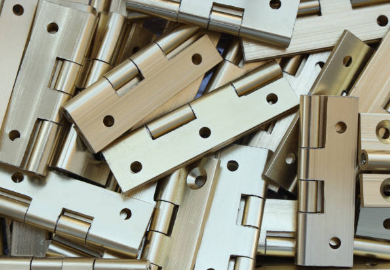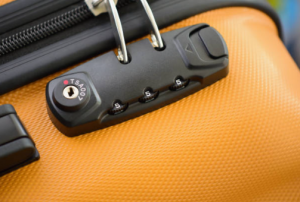In daily life and work, aluminum cases have become a popular choice for storing and transporting items due to their durability, light weight, and attractive appearance. Whether you’re carrying important documents for business trips or packing personal belongings for travel, a high-quality aluminum case can provide reliable protection. However, with a wide variety of aluminum cases on the market and varying levels of quality, consumers are often left confused when making a purchase. So, how exactly can you evaluate the quality of an aluminum case?
1. Hinges: The “lifeline” of an aluminum case
Hinges are crucial components for opening and closing an aluminum case, directly affecting both the user experience and the product’s lifespan. When assessing the quality of hinges, consider the following aspects:
· Material and Craftsmanship:
High-quality aluminum case hinges are usually made of stainless steel or high-strength alloy materials. These materials offer excellent corrosion resistance and wear resistance, maintaining stable performance over time. Inspect the surface of the hinges closely—quality hinges should be smooth and even, with no cracks, and firmly attached. In contrast, lower-quality hinges may use ordinary iron that rusts easily, with rough connections that may loosen or even break after some use.

· Smoothness of Opening and Closing:
Try opening and closing the aluminum case to feel the hinge movement. Good hinges should open and close smoothly without sticking or making strange noises. The opening angle should also be large enough—ideally around 95 degrees—making it easier and safer to access and organize items inside without the lid accidentally falling and causing injury. If you feel resistance or hear noticeable grinding sounds, the hinges may be of poor quality.
· Load-Bearing and Stability:
The load-bearing capacity of the hinges determines whether the case can support the weight of its contents. When purchasing, try gently shaking the open case to see if the hinges remain stable. High-quality hinges will keep the case steady under weight without noticeable wobbling or tilting. Poorer hinges may loosen under weight, possibly causing deformation of the case.
2. Locks: The “guardian” of your belongings
The lock is a key security feature of an aluminum case. Its quality is critical to keeping your items safe. Evaluate the lock quality by considering:
· Type of Lock:
Common lock types for aluminum cases include standard latch locks, TSA-approved locks, and key locks. Latch locks are simple to operate and suitable for daily use but offer lower security. TSA locks are essential for international travel—they are certified by the U.S. Transportation Security Administration, allowing customs officers to open them with special tools without damaging the lock or the case while keeping your belongings secure. If you travel internationally often, a case with a TSA lock is recommended. Key locks offer high security, making them hard to open without the correct key, providing reliable protection for important documents or valuables. Key locks also have a simple and stable design, are less prone to electronic failure, and tend to last longer.

· Lock Material and Structure:
Quality locks are typically made from metal materials like zinc alloy or stainless steel, which are strong and hard to pry open or damage. Check the structure of the lock—the core should be precisely made, keys should insert and turn smoothly, and number dials on combination locks should turn easily, with password setting and resetting being straightforward. Poor-quality locks might use plastic materials that are easy to break, with rough lock cores that compromise security.
3. Material Thickness: The key to sturdiness
The material thickness of an aluminum case directly affects its strength and impact resistance. To evaluate material thickness:
· Check Product Specifications:
Reputable brands typically disclose material thickness in their product details. Generally, a panel thickness between 0.8mm and 1.2mm is ideal—thick enough for durability without being overly heavy. If the product lacks clear thickness information or uses material that’s too thin, the case may have poor protective performance and deform easily under impact or pressure.
· Feel and Test It Directly:
Touch the case surface to assess its hardness. A high-quality case will feel solid and hard, resisting dents when pressed. Also, check the corners and seams; these parts reflect the overall quality of the material. If corners appear noticeably thinner or seams aren’t tightly fitted, the case is more likely to get damaged during use.
4. Other Factors Affecting Aluminum Case Quality
In addition to hinges, locks, and material thickness, other factors can influence the overall quality:
· Exterior Appearance and Craftsmanship:
Inspect the surface carefully—it should be smooth and flat, without scratches, dents, or color inconsistencies. Check whether the corners are rounded to avoid hand injuries during use.
· Internal Structure Design:
A well-designed interior increases practicality and storage efficiency. A high-quality aluminum case often features customizable compartments, straps, and zippered pockets to help organize items. These compartments should be sturdy, with reliable straps and zippers that can securely hold and protect contents.
· Brand and After-Sales Service:
Choosing a well-known brand usually ensures better quality and after-sales support. Reputable brands follow strict production standards and perform multiple quality checks. Good after-sales service ensures you’ll receive timely repairs or replacements if any quality issues arise. Before buying, research the brand’s reputation and customer reviews to choose one with a strong track record.

Evaluating the quality of an aluminum case requires considering multiple factors. When purchasing, carefully examine the hinges, locks, material thickness, and also pay attention to the exterior, interior design, and brand support. By following these guidelines, you can select a high-quality aluminum case that meets your needs and provides reliable protection for your travels and storage.
Post time: May-07-2025






